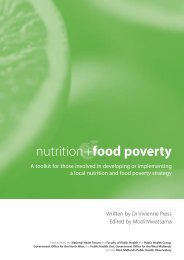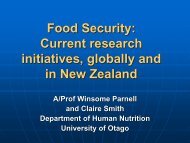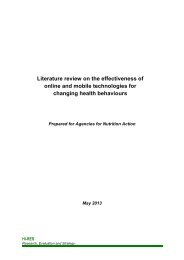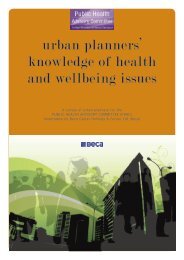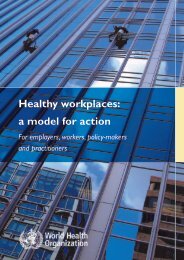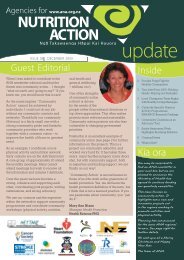enhancing food security and physical activity for maori, pacific and ...
enhancing food security and physical activity for maori, pacific and ...
enhancing food security and physical activity for maori, pacific and ...
- No tags were found...
Create successful ePaper yourself
Turn your PDF publications into a flip-book with our unique Google optimized e-Paper software.
Enhancing Food Security <strong>and</strong> Physical Activity <strong>for</strong> Māori, Pacific <strong>and</strong> Low-income Peoplesthe additional nutrients do not lead to improvements. This study does not examine indetail the impact of school lunches on children from <strong>food</strong> insecure households. Cooket al, 21 in a US cross-sectional study, found associations between children from <strong>food</strong>insecure households <strong>and</strong> adverse health outcomes, <strong>and</strong> that health outcomes wereworse again if the child themselves was considered <strong>food</strong> insecure. The associationbetween <strong>food</strong> <strong>security</strong> <strong>and</strong> adverse health outcomes was reduced with participation inthe Food Stamp Programme. These studies suggest that providing benefits to thehousehold, rather than to the child directly, may have more of an impact on childhealth outcomes. However, these studies are relatively small, <strong>and</strong> do not examine allassociations that could more fully explore these scenarios.A number of studies have examined the impacts of school breakfast <strong>and</strong> fruit schemeson child outcomes. These studies are largely cross-sectional <strong>and</strong> not designed tomeasure effect on <strong>food</strong> <strong>security</strong>. Given this, the picture appears to be mixed.Breakfast provided at school has been associated with increased school attendance<strong>and</strong> per<strong>for</strong>mance; however, a review of studies notes caution in generalising fromthese studies due to size <strong>and</strong> methods. 14 A study of 22 primary schools in deprivedareas of London (13 with <strong>and</strong> 9 without breakfast clubs), showed a significant increasein academic test scores <strong>for</strong> schools with breakfast clubs, comparing the year be<strong>for</strong>ethe clubs were introduced with the year after. These improvements were sustained insubsequent years. 22 There was no change in test scores <strong>for</strong> schools without breakfastclubs. Principals from schools with breakfast clubs reported several benefits <strong>for</strong>children, including: improved social skills; improved punctuality; improvedconcentration levels; <strong>and</strong> promoting links between schools <strong>and</strong> parents. 22Effect on EquityIn the UK <strong>and</strong> US, not all children in a school will be eligible <strong>for</strong> free school meals, <strong>and</strong>several studies report concerns over stigma as a reason <strong>for</strong> children not taking up freemeals. 14 In the US income <strong>and</strong> parental education are negatively associated with freeschool meal take-up. 18 Low levels of take-up are likely to mean that those childrenmost at risk of <strong>food</strong> in<strong>security</strong> are not receiving the benefit of free <strong>food</strong>. There is someindication from breakfast clubs <strong>and</strong> fruit schemes that universal eligibility within aschool increases take-up. 6 17Sustainability <strong>and</strong> Acceptability to StakeholdersStudies that include qualitative components with teachers <strong>and</strong> school staff generallyreport positive attitudes from students, 20 school staff, 22 <strong>and</strong> parents. 23 This suggestsgeneral acceptability to stakeholders if the organisation of the <strong>food</strong> provision is easy to14 22 23access <strong>and</strong> meets their needs.Cost Benefit of School Food ProvisionThere appear to have been few studies that examine the costs <strong>and</strong> benefits of school<strong>food</strong> provision. A review of breakfast <strong>and</strong> fruit programmes suggests that benefits arelikely to be larger where the <strong>food</strong> is designed as additional, rather than a substitute <strong>for</strong>home provision, such as fruit schemes. 14 A study by Currie, 24 while drawing onlytentative conclusions, suggests that direct in-kind provision to children, such as school<strong>food</strong> programmes, are likely to have a bigger positive impact on children’s wellbeingthan cash transfers to the home.54



